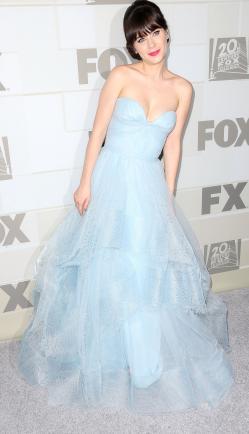Last week, arbiters of the “feminist” label considered the application of manic pixie dream actress, producer, and singer-songwriter Zooey Deschanel. “I want to be a fucking feminist and wear a fucking Peter Pan collar,” Deschanel told Glamour this month. “So fucking what?”
Kat Stoeffel of The Cut begrudgingly accepted Deschanel’s feminist identification, though part of her expected Deschanel to “go into her Muppet voice and claim not to know how babies were made.” Salon’s Mary Elizabeth Williams anointed Deschanel “a role model to annoying girl-women everywhere.” A Jezebel commenter allowed, “I don’t like you Zooey, but you have won this round.”
In short, everyone hates Zooey. I used to despise Deschanel’s Pinterest-pinned image, too. I hated her ukulele-accompanied olde tyme singing voice, her pink jammies Siri commercial, and her human elf routine. Most of all, I hated her blank-eyed, dress-twirling turn as the object of Joseph Gordon-Levitt’s obsession in (500) Days of Summer—the role that launched 1,000 indie wet dreams.
But today, I come to you as a convert to the cult of Zooey Deschanel. I used to think that I couldn’t stand to watch Deschanel’s infantilized archetype traipse through another quirky romantic scenario. As it turns out, I just hadn’t yet seen enough of her.
The tide turned when Deschanel debuted in Fox’s sitcom New Girl as Jess Day, a recently dumped elementary school teacher forced to room with three Craigslist dudes (who quickly become her buddies). Deschanel’s character in the show looks similar to Summer’s Summer—she is unapologetically girly, hopelessly romantic, and frequently framed in a headband and a baby doll dress. But as the show develops, she becomes many other things: sexually adventurous, professionally aggressive, and owner of a low, maniacal laugh that cuts straight through her happy-go-lucky exterior every time she releases it. She’s also surrounded by a cast of male friends—namely, the flamboyantly metrosexual Schmidt and the childishly emotional Nick—whose personality quirks function, alternately, as foils and mirrors of Jess’ own.
When New Girl debuted, critics called foul that an attractive woman like Deschanel would be so quickly relegated to the friend zone by these three guys. But the guys (like the blogs that criticize Deschanel) aren’t getting off on her feminine quirks. In fact, they often ridicule Jess’ bizarre personal habits, until they find themselves unwittingly invested in her Dirty Dancing cryfest themselves. It is this inversion of that manic pixie dream trajectory that is the key to Deschanel’s success as a TV leading lady. In films like (500) Days, Deschanel functions as a one-dimensional romantic interest who flits in and out of the frame while her boyfriend “figures himself out.” In New Girl, she is the star grappling with her own idiosyncrasies as her romantic interests come and go. For Jess, feminine clothing, hobbies, and communication styles have personal, not sexual, value. But they don’t define her, either. The sitcom format allows the Deschanel archetype to breathe into a fully realized character, with real human motivations, complex dimensions, and a healthy dose of self-awareness. And Deschanel the actress makes it all work.
It doesn’t hurt that this iteration of the character was written by 30-year-old screenwriter Elizabeth Meriweather, and produced by Deschanel herself. Summer, on the other hand, was the product of screenwriter Scott Neustadter, a jilted ex who, in the film’s opening credits, describes Summer’s real-life inspiration as a “bitch.” No wonder we don’t like her!
Critics may still react with surprise and disdain when Deschanel calls herself a “fucking feminist,” but Deschanel has been pushing against Hollywood’s masculine expectations for a while. “When you get sent scripts and you see you’re always playing someone’s girlfriend when you want to be the central role, it’s so depressing,” she said after (500) Days was released.
I realize now that I never really hated Zooey Deschanel’s feminine performances (it’s hardly rare for a woman in Hollywood to project a feminine image). I hated the way that her femininity had been cast through the lens of male fantasy. New Girl gives her the opportunity to present an alternate view. New Girl may wring comedy from Deschanel’s girly personality, but it hits its dramatic arc when we come to accept Jess as a person, ruffles and all.
